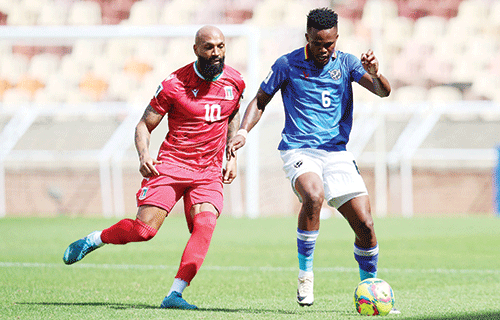As Namibia’s 2025/26 national budget is tabled today in the National Assembly, there is a palpable sense of hope within the sport community.
The desire for an increase in funding for sport has never been more urgent.
Athletes – women and men – have long felt sidelined.
Moreover, infrastructure across the country remains in a dilapidated state.
In the 2023/24 fiscal year, Namibia’s Ministry of Sport, Youth and National Service received an allocation of N$473.2 million.
With the new budget on the horizon, key voices in Namibian sport have shared their thoughts on what changes are needed to elevate the nation’s sporting landscape.
In a series of interviews with sport producer Kavee Vezemburuka, sport consultant Matthew Haikali, sport administrator Tunomwaameni Epafras, former sport reporter Otniel Hembapu and sport reporter Marco Ndlovu, the common thread is clear.
Now is the time for decisive action to rejuvenate the sport sector.
New leadership
Vezemburuka is optimistic about the future of sport in Namibia – thanks to the appointment of Sanet Steenkamp and Dino Balotti as ministers of the newly expanded Ministry of Education, Innovation, Youth, Sport, Arts and Culture.
“They’re energetic and bring fresh perspectives. We’re hopeful that these new leaders will take bold steps to turn things around.
He believes that relying on the same systems and individuals who have failed to push sport forward in the past will only keep Namibia’s athletic sector stagnant.
For the 2025/26 budget, Vezemburuka advocates a significant increase in funding directed toward grassroots development.
He stressed the importance of investing in youth programmes and academies, particularly in rural areas, to unearth hidden talent.
He argued that infrastructure is a major concern.
“We need to invest in rural sport facilities, renovate key stadiums like the Independence Stadium, which is currently unfit for international matches, and provide financial backing for national and junior teams to prepare adequately for global competition,” Vezemburuka stated.
The call for accountability extends to the federations.
He highlighted the need for transparent funding management and policies to prevent administrative disputes that hinder athletes’ progress.
Vezemburuka believes the relationship between sport bodies and the corporate sector needs strengthening to ease financial burdens on the government.
Broader vision for future
Epafras argues for the swift amendment of the Sports Act to keep pace with evolving governance standards in sport.
“We need to ensure that sport structures are aligned from grassroots development through to national federations,” he said.
He advocates for a Sport Development Fund that would provide sustained support for federations and the Namibia Sport Commission (NSC).
Epafras sees this as a vital step toward ensuring the long-term sustainability of sport in Namibia.
Furthermore, he calls for more inclusive policies, such as offering tax exemptions to sport federations and securing resources from national industries to fund sport initiatives.
“Even fishing quotas could be allocated to federations,” he suggested, citing the importance of diversifying funding sources. Epafras highlighted the need for “after-career” programmes to prepare athletes for life after sport – whether in sport administration or other industries like agriculture or manufacturing.
Addressing issues of underfunding
Hembapu highlighted one of the most critical issues: the underfunding of the NSC. “Currently, about 90% of the NSC’s budget goes toward salaries rather than development projects. This is not sustainable,” he pointed out.
With the ministry now covering a broad portfolio, which includes education, youth, sport and culture, Hembapu stressed the need for comprehensive policy review to re-align the country’s sport sector with global best practices.
His frustration is palpable as he reflects on Namibia’s international sporting image. “It’s embarrassing and intolerable for our national teams to keep playing their home games abroad,” he said.
“This situation must change. Namibia is not a war-torn country or one ravaged by natural disasters, yet our sport infrastructure are in a dire state,” he noted.
He believes the solution lies in transforming sport into a self-sustaining industry that can rival Namibia’s established sectors like tourism, agriculture and fishing.
“Sport can employ thousands of young Namibians. But this requires bold leadership and political will, which has been lacking for decades,” he asserted.
Reforming legislation and private sector involvement
Ndlovu champions the need for reform within the Sports Act and specific sports legislation, such as those governing wrestling and boxing.
He advocates for stronger private sector involvement, suggesting that the government introduces laws requiring companies to contribute a percentage of their profits to sport development.
“There should be legislation that makes the government responsible for national teams,” Ndlovu added.
He noted the crucial role sport play in national pride and identity.
Ndlovu calls for infrastructure development that can make sport a major contributor to Namibia’s gross domestic product.
“Sport should no longer be seen as just a recreational activity. It should be a pillar of our economy,” he stated.
-lmupetami@nepc.com.na



